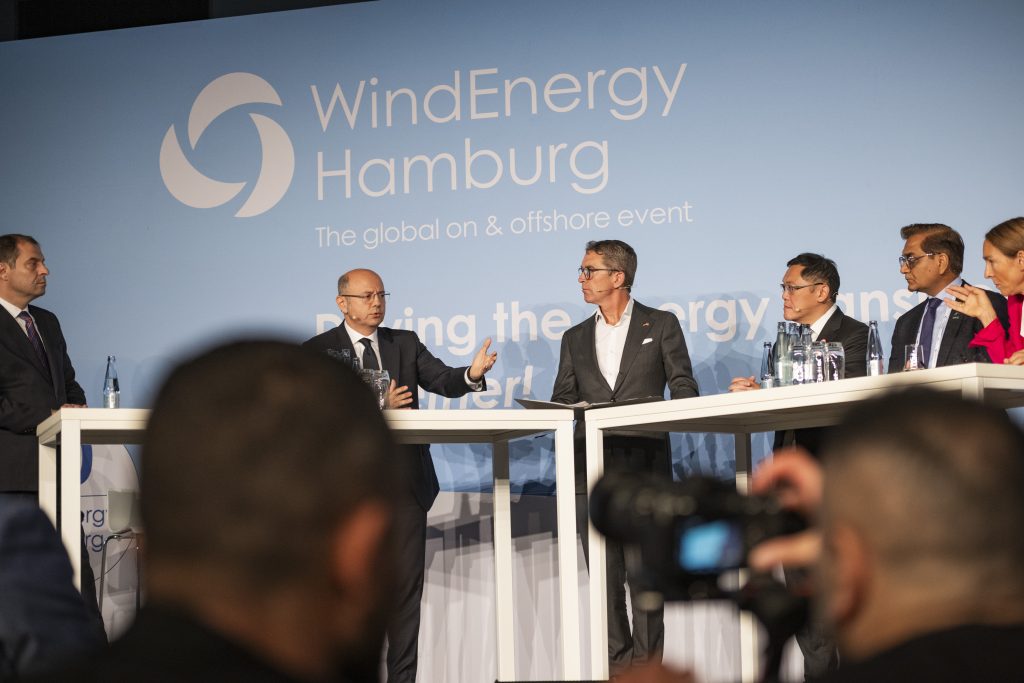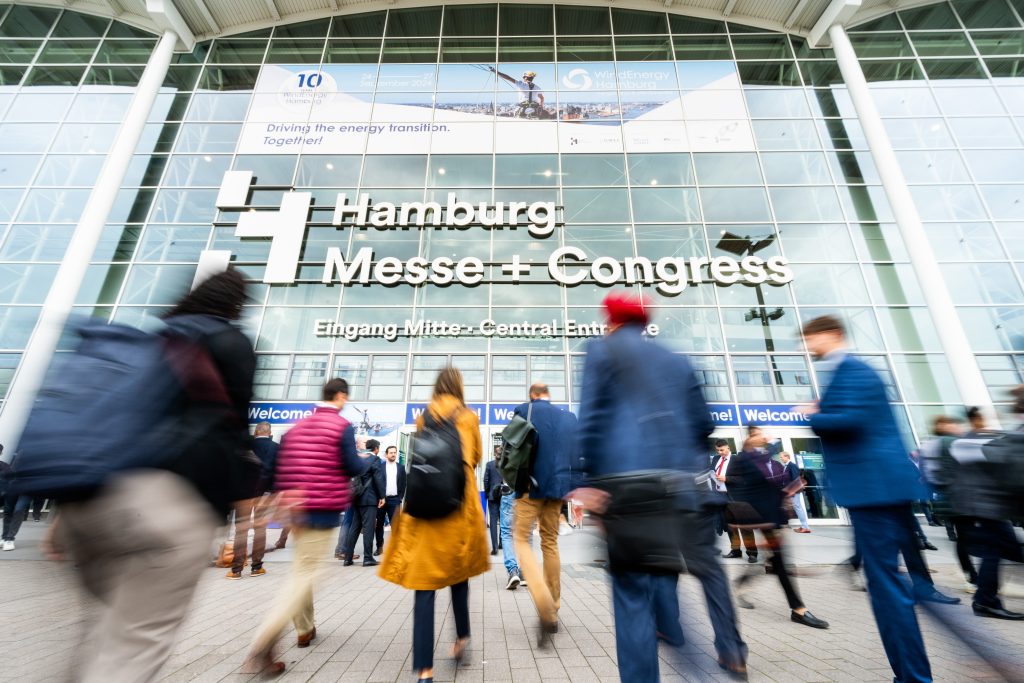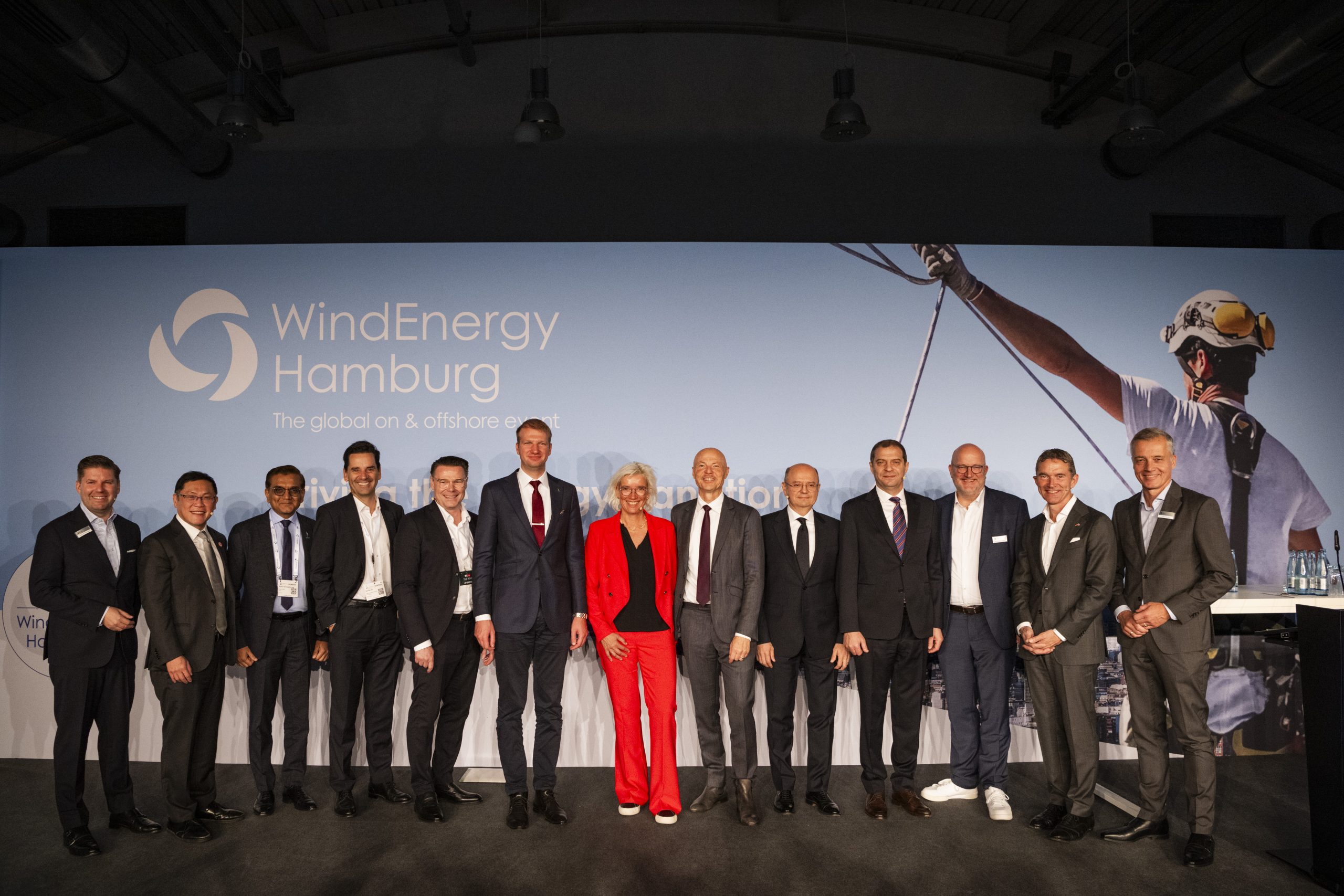WindEnergy Hamburg 2024 is sending a powerful signal: At the official opening ceremony, with Vice-chancellor Dr Robert Habeck attending remotely by video, leading representatives from politics and the industry emphasised the importance of clear regulations and international cooperation in driving the energy transition. Dr Melanie Leonhard, Hamburg’s Senator for Economics and Innovation, emphasized the radiance of WindEnergy Hamburg in her speech. As the perfect platform to promote these efforts, WindEnergy Hamburg features more than 1,600 exhibitors and over 200 conference slots.
“From turbine technology and grid expansion to storage and smart AI solutions, renewable energy is, of course, front and centre at WindEnergy Hamburg. But like every trade fair, WindEnergy Hamburg thrives on the live interaction of people, and we are excited to see so many participants devoting all their energy and commitment to making this event special,” said Heiko M. Stutzinger, CEO of Hamburg Messe und Congress, at the opening of WindEnergy Hamburg. The trade fair chief and his team have invited top-flight guests: Dr Robert Habeck, Federal Minister for Economic Affairs And Climate Protection, participated remotely in the opening ceremony of the world’s leading wind industry trade fair, which celebrated its inauguration ten years ago. This was followed by international government and industry representatives discussing the opportunities and challenges brought about by the energy transition:
- Udo Bauer, CEO – Enercon, representing VDMA Power Systems
- José Luis Blanco, CEO – Nordex Group / Chairman – WindEurope
- Lee Chuan Teck, Executive Chairman – Enterprise Singapore
- Zafer Demircan, Vice Energy Minister, Republic of Türkiye
- Bärbel Heidebroek, CEO – Landwind Group / Chairwoman – BWE
- Kaspars Melnis, Minister for Climate and Energy, Latvia
- Andrew Mitchell, British Ambassador to Germany
- Dr. Philipp Nimmermann, State Secretary at the Federal Ministry of Economics and Climate Protection, Germany
- Parviz Shahbazov, Energy Minister, Republic of Azerbaijan
- Tinne Van der Straeten, Energy Minister, Belgium
- Girish Tanti, Vice-Chairman – Suzlon Group / Vice-Chair – GWEC, India
Wind energy in Europe: Paving the way to energy independence
Wind energy currently covers 20 per cent of Europe’s energy consumption. Governments want this share to rise to 35 per cent by 2030, and to more than 50 per cent by 2050. Philipp Nimmermann, State Secretary at the Federal Ministry of Economics and Climate Protection, stressed that Germany is spearheading these efforts, having increased the speed of wind energy expansion significantly. “We are seeing record numbers of approvals and contract awards in tender processes, but the industry is capable of even more,” stated Bärbel Heidebroek, CEO of Landwind Group and Chairwoman of the German Wind Energy Association (Bundesverband Windenergie, BWE). Latvia, after constructing LNG storage facilities and building up its renewable energy capacity, is almost fully independent from Russian natural gas today. The country wants to generate all of its power from renewable sources by 2030. To realise this vision, Latvia is planning to install 1.5 to 2 GW of additional wind energy capacity, said the Latvian energy minister Kaspars Melnis. “This minimises our dependence on imported power while allowing us to operate without fossil fuels.”
Tackling challenges: Investments and infrastructure
When expanding wind energy capacity, it is important to keep an eye on the entire energy value chain, said José Luis Blanco, Chairman of WindEurope and CEO of Nordex Group. “It is about energy security, competitiveness, and resilience: bottlenecks like electricity grids and transport infrastructure need to be addressed in acceleration of new wind power deployments.” Udo Bauer, CEO of wind turbine manufacturer Enercon and representative of the industry association VDMA Power Systems, emphasised the importance of fair competition in the market amid growing pressure from non-European market participants: “We need a level playing field that ensures equitable competition in Germany and Europe and punishes price dumping. The industrial policy framework for the onshore wind segment must give us a chance to continue investing in Germany and Europe.”

Global cooperation: Opportunities and synergies
The second discussion panel dealt with the international dimension of the energy transition: “Tripling renewables and combating climate change requires a precise balance of global, regional, and local strategies,” said Girish Tanti, Vice-Chairman of Suzlon Group and Co-Chair of the Global Wind Energy Council (GWEC).
This means that countries like Azerbaijan must come aboard: The host country of COP29, the next United Nations Climate Conference, looks back on a long fossil fuel history but is now showing openness for change. Needing a total of 10 GW of green energy generation capacity to cover its domestic energy need, decarbonise, and export energy, Azerbaijan wants to integrate an initial 2 GW into its energy system in the coming years. In this context Lee Chuan Teck from Enterprise Singapore underlined the importance of global collaboration: “In the journey towards clean energy, there is scope for more enterprises in Europe and Asia to work together to access each other’s technologies, capabilities and markets.” Leveraging these synergies is a must for a successful fight against climate change.
WindEnergy Hamburg – a global hub
“WindEnergy Hamburg is the main hub for the wind power industry: It brings together all major global stakeholders of the wind industry and fosters close interaction,” said Claus Ulrich Selbach, Business Unit Director Maritime & Technology Fairs at Hamburg Messe und Congress. For four days, innovation, investments and the future of wind energy are in focus at WindEnergy Hamburg, a trade fair that presents unique opportunities to establish new business partnerships and join hands in exploring solutions to the global challenges of the energy transition.

About WindEnergy Hamburg
Every two years one of the most fascinating industries meets for the leading global networking event for wind energy: At WindEnergy Hamburg, which takes place right in the heart of the vibrant northern German port city, around 1,600 companies from 40 countries present their innovations and solutions in ten exhibition halls to up to 40,000 visitors from 100 different nations. Covering 75,000 m² across the exhibition campus, equipment manufacturers and suppliers representing all stages of the onshore and offshore wind energy value chain provide a comprehensive overview of the market. The trade fair is accompanied by conference sessions where top-ranking experts address the industry’s current key topics. The WindEnergy Hamburg team develop this programme jointly with their partners, including the Global Wind Energy Council (GWEC), the European organisation WindEurope, the national industry associations VDMA and BWE, leading industry media, and companies from the wind energy sector. From 24 until 27 September 2024, all conference sessions will take place free of charge on five open stages located inside the exhibition halls.
Contact
Jusrah Doosry
Press & PR
Tel. +49 40 3569-2447
Fax +49 40 3569-69 2447



























